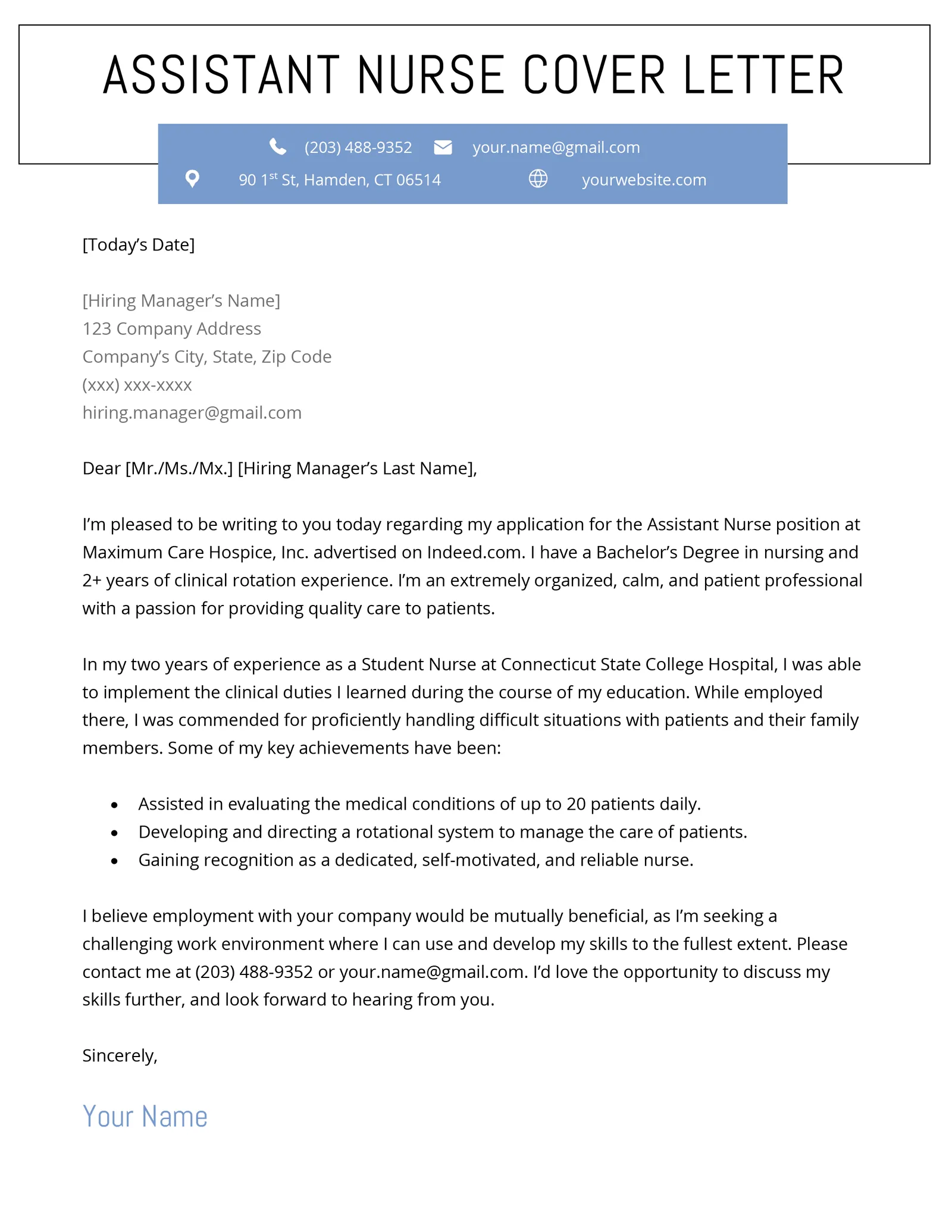Crafting the Perfect Cover Letter
As a new graduate nurse, your cover letter is your first impression. It’s an opportunity to showcase your potential and stand out from the crowd. Unlike experienced nurses with extensive work histories, new grads often rely on their education, clinical rotations, and a strong personality to impress potential employers. A well-crafted cover letter is crucial for highlighting these aspects and securing an interview. It’s not just a formality; it’s a chance to articulate why you’re the ideal candidate, even with limited professional experience. The goal is to demonstrate your eagerness to learn, your commitment to patient care, and your understanding of the nursing profession.
Highlighting Your Skills and Education
Your nursing education forms the foundation of your cover letter. Detail your degree, the school you attended, and your graduation date. Be specific about the skills you acquired during your program. This includes technical skills like administering medications, wound care, and patient assessment. Furthermore, mention any specialized training or certifications you’ve obtained, such as BLS or ACLS. Quantify your achievements whenever possible. For instance, if you excelled in a particular clinical rotation, mention it. If you received any academic honors, be sure to include those as well. Doing so establishes credibility and demonstrates your preparedness to take on the responsibilities of a registered nurse. Consider using keywords from the job description to align your skills.
Focus on Relevant Clinical Experience
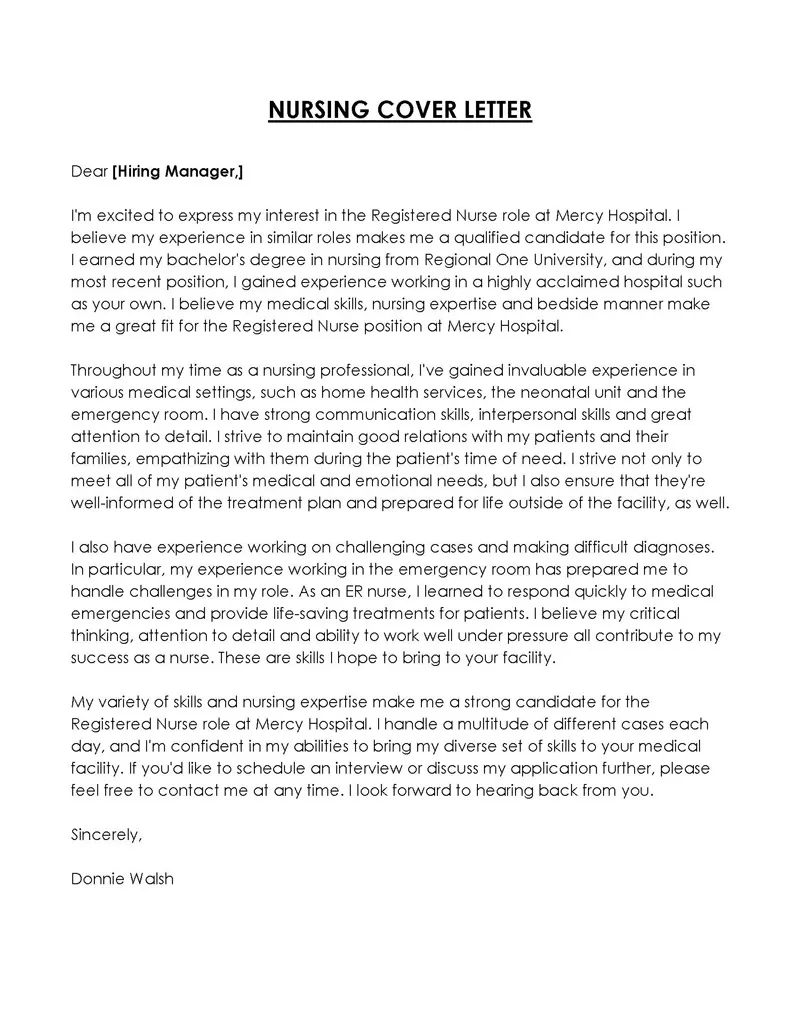
While you might lack extensive work experience, your clinical rotations offer valuable insights into your skills and abilities. Detail your experiences in different clinical settings, such as medical-surgical, critical care, or pediatrics. For each rotation, briefly describe your responsibilities, the patient population you served, and any notable accomplishments. Did you manage a high patient load? Did you successfully implement a new care plan? Highlighting these instances shows you’re a capable and adaptable learner. Also, always emphasize any leadership roles you took on. Perhaps you served as a charge nurse, or maybe you mentored a fellow student. These experiences demonstrate your potential and highlight your drive to exceed expectations.
Emphasizing Soft Skills and Personality
Beyond your clinical skills, your soft skills and personality traits are just as important. Nursing is a profession that demands empathy, communication, and teamwork. In your cover letter, discuss your interpersonal skills, such as your ability to communicate effectively with patients and families. Include examples of how you’ve resolved conflicts, collaborated with other healthcare professionals, or demonstrated compassion during challenging situations. Highlight qualities like adaptability, critical thinking, and problem-solving skills. Describe your work ethic and dedication to providing the best possible care. Your goal is to show that you’re not just a competent nurse, but also a positive and valuable member of the healthcare team. These points provide evidence of your ability to fit into the team and deliver patient-centered care.
Structuring Your Cover Letter
A well-structured cover letter is easy to read and navigate. Follow a standard format with an introduction, body paragraphs, and a conclusion. The introduction should grab the reader’s attention and state your purpose. In the body, elaborate on your qualifications, experiences, and skills. Then, in the conclusion, reiterate your interest in the position and express your enthusiasm for an interview. This structure helps you organize your thoughts logically and allows the hiring manager to quickly grasp your key strengths. Keeping it concise is essential; aim for no more than one page, which makes it easier for the hiring manager to process the information quickly. Use clear, concise language and avoid jargon. The goal is to communicate your key skills in an engaging, easy-to-read format.
The Importance of a Strong Opening
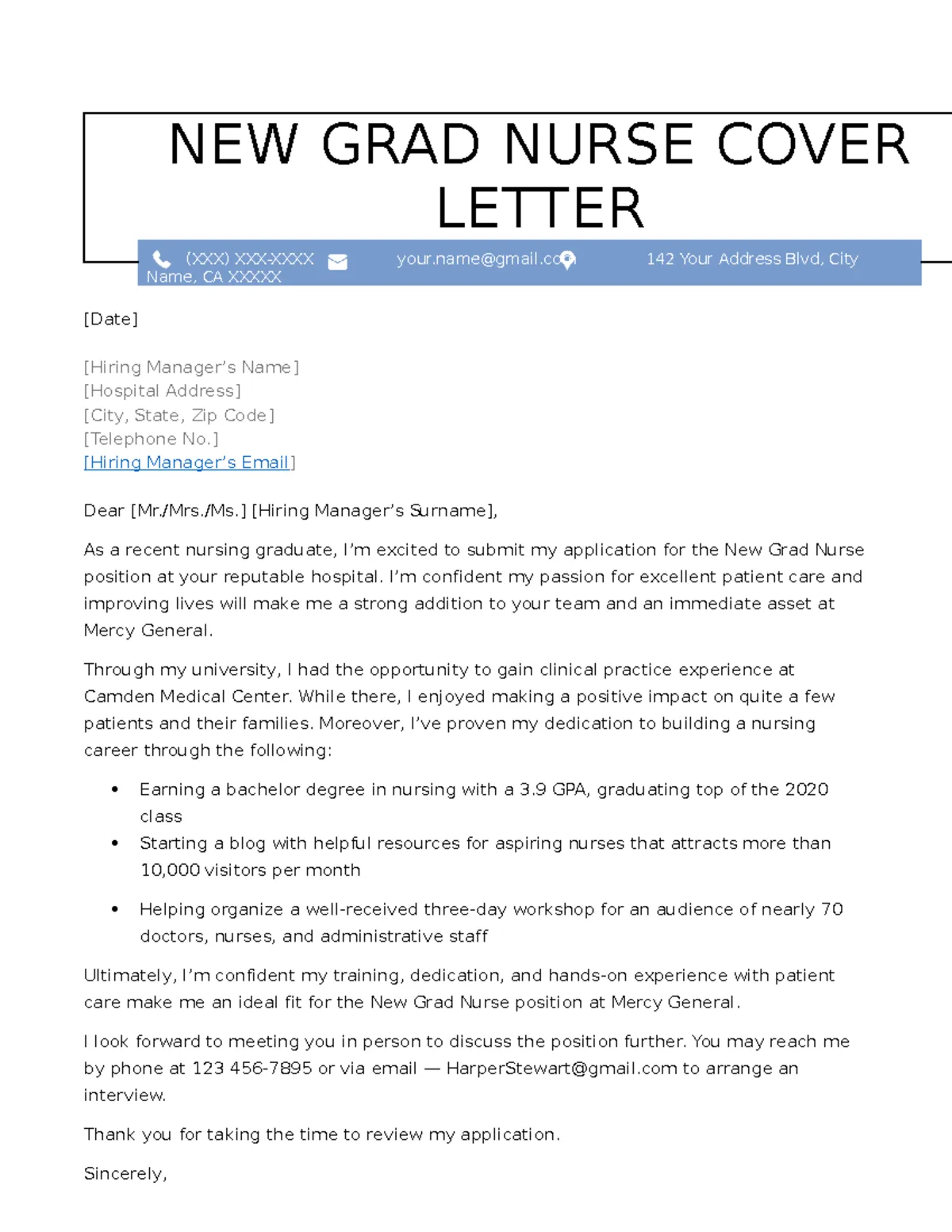
Your opening paragraph is your first and often only chance to capture the hiring manager’s attention. Start by stating the position you’re applying for and where you saw the job posting. Then, immediately demonstrate your interest in the role and the healthcare organization. A strong opening will showcase your enthusiasm and willingness to take initiative. Avoid generic openings and tailor your introduction to the specific job and the hospital’s or clinic’s mission. Mention something specific that excites you about the opportunity or a particular aspect of the facility that aligns with your goals. Show you understand what they do and why you want to work with them.
Detailing Your Experience and Achievements
The body of your cover letter should provide detailed examples of your skills and achievements. Support your claims with specific examples from your clinical rotations and any other relevant experiences. Quantify your achievements whenever possible. For example, did you improve patient outcomes during a rotation? Did you receive positive feedback from patients or supervisors? Use action verbs to describe your responsibilities and accomplishments. Instead of just stating that you “provided patient care,” describe how you “administered medications, monitored vital signs, and educated patients.” This approach brings your experiences to life and highlights your capabilities. By including concrete examples, you can prove to the employer that you’re a capable and competent individual, even with limited professional experience.
Crafting a Compelling Closing
The closing paragraph should reiterate your interest in the position and express your enthusiasm for an interview. Thank the hiring manager for their time and consideration. Reiterate your qualifications and emphasize your eagerness to contribute to the organization. Provide a clear call to action by stating that you are available for an interview. Include your contact information so the hiring manager can easily reach you. Be professional and enthusiastic to leave a positive, lasting impression. It’s your final opportunity to make a positive statement. Make it count by expressing your dedication and passion.
Tailoring Your Cover Letter
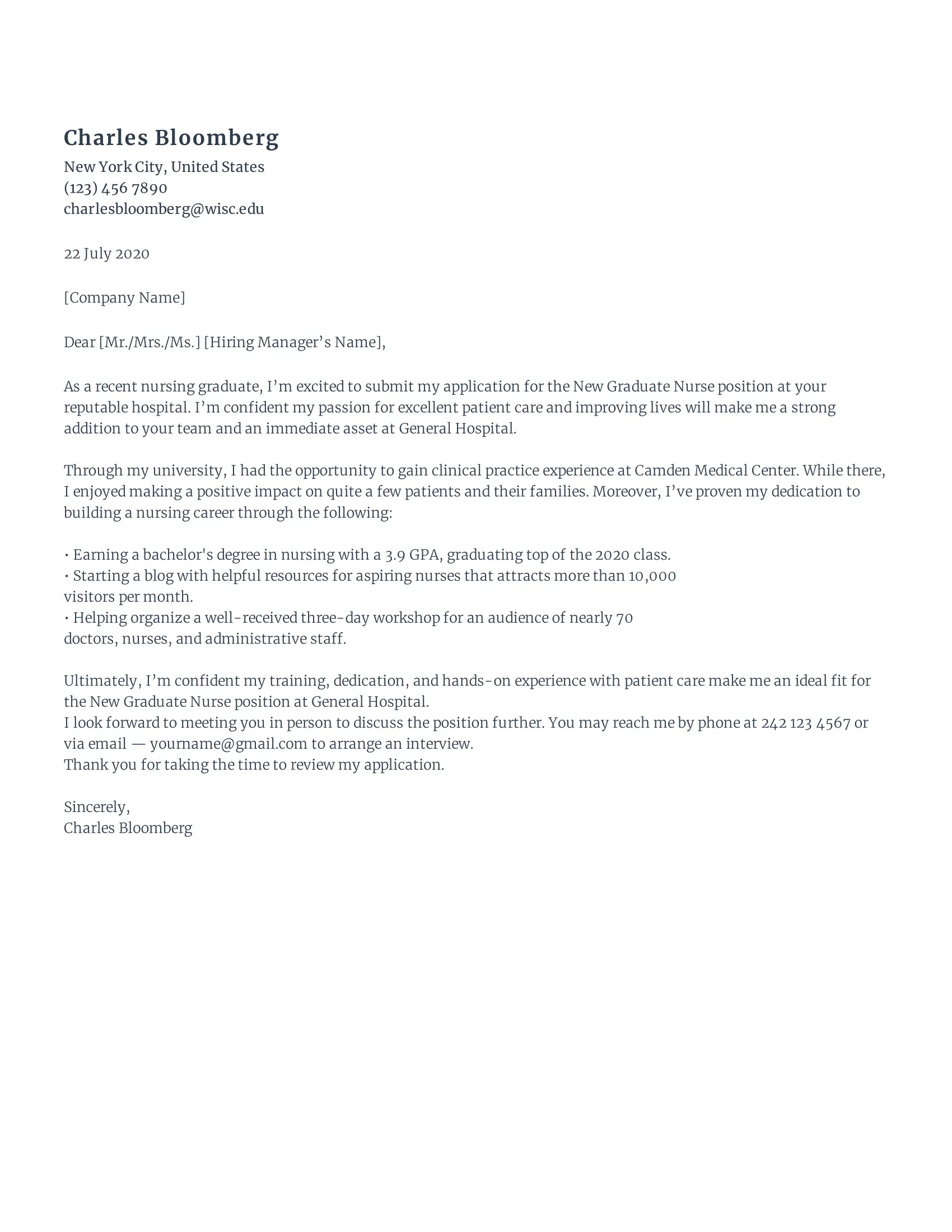
A generic cover letter that’s sent to every employer is a mistake. Customizing your cover letter to the specific job and healthcare organization is critical. Research the hospital or clinic, understand its mission, values, and the specific needs of the role. Mention specific aspects of the organization that appeal to you and how your skills align with their requirements. Tailor your letter to the job description by using the same keywords and phrases. By personalizing your cover letter, you’ll demonstrate that you’ve taken the time to understand the organization and its requirements. Tailoring your cover letter shows you’re genuinely interested in the opportunity and aren’t just sending out generic applications.
Researching the Hospital or Clinic
Before you write your cover letter, research the hospital or clinic. Learn about its mission, values, and the services it provides. Explore its website, social media channels, and any recent news articles. Understanding the organization’s culture and values will help you tailor your cover letter and demonstrate a genuine interest in working there. Identify any specific programs, departments, or initiatives that align with your career goals and mention them in your cover letter. For instance, if the hospital is known for its research or community outreach, highlight your interest in these areas. Researching the organization demonstrates your commitment to the opportunity.
Matching Your Skills to the Job Description
Carefully review the job description and identify the key skills and qualifications the employer is seeking. Then, in your cover letter, highlight how your skills and experiences align with those requirements. Use the same keywords and phrases from the job description to show that you meet their needs. Give specific examples of how you’ve demonstrated those skills in your clinical rotations or other experiences. Make sure your cover letter reads as a perfect fit for the role by matching it closely. Customize your cover letter to match the job posting and highlight the skills most relevant to the position. This approach ensures that your application is a strong match for the employer’s needs.
Showcasing Your Passion for Nursing
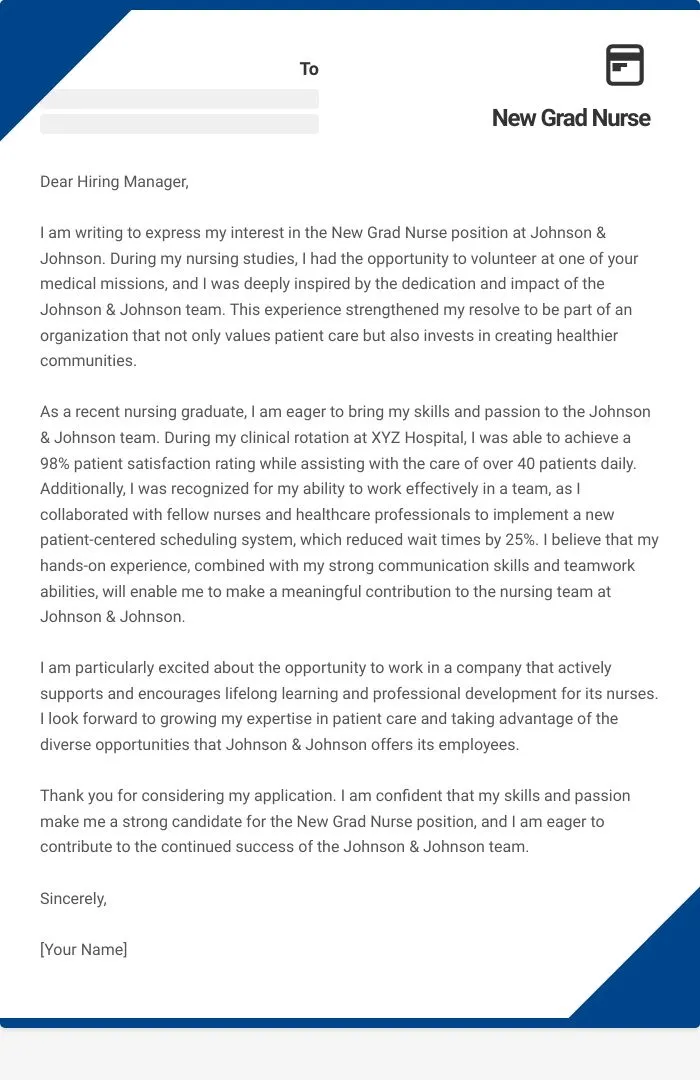
Your cover letter is an opportunity to show your passion for nursing. Explain why you chose nursing as a career and what motivates you to provide excellent patient care. Share specific experiences that ignited your interest in nursing and illustrate your dedication to the profession. By expressing your enthusiasm, you will convey genuine interest in nursing, and your passion for helping others. Show why nursing is a career to you and why you find it fulfilling. This will make your cover letter more compelling and demonstrate that you’re not just seeking a job, but a career. Being a passionate nurse is important.
Formatting and Proofreading Your Cover Letter
Proper formatting and proofreading are essential for creating a professional cover letter. Pay close attention to the layout, font, and overall presentation. Ensure your cover letter is easy to read and free of errors. Poorly formatted and error-filled cover letters reflect a lack of attention to detail, and can cost you the job. Always strive to make sure your cover letter is the best it can possibly be.
Choosing the Right Font and Layout
Choose a professional font like Times New Roman, Arial, or Calibri. Keep the font size between 10 and 12 points. Use a standard layout with one-inch margins and clear spacing between paragraphs. Use bolding for headings and other important sections. Make sure your cover letter is visually appealing and easy to read. A clean, professional layout shows that you’re organized and pay attention to detail. This makes your cover letter much easier for the hiring manager to read and process, making you look better. Formatting can be a huge factor when it comes to making a good impression on a potential employer.
Proofreading for Errors
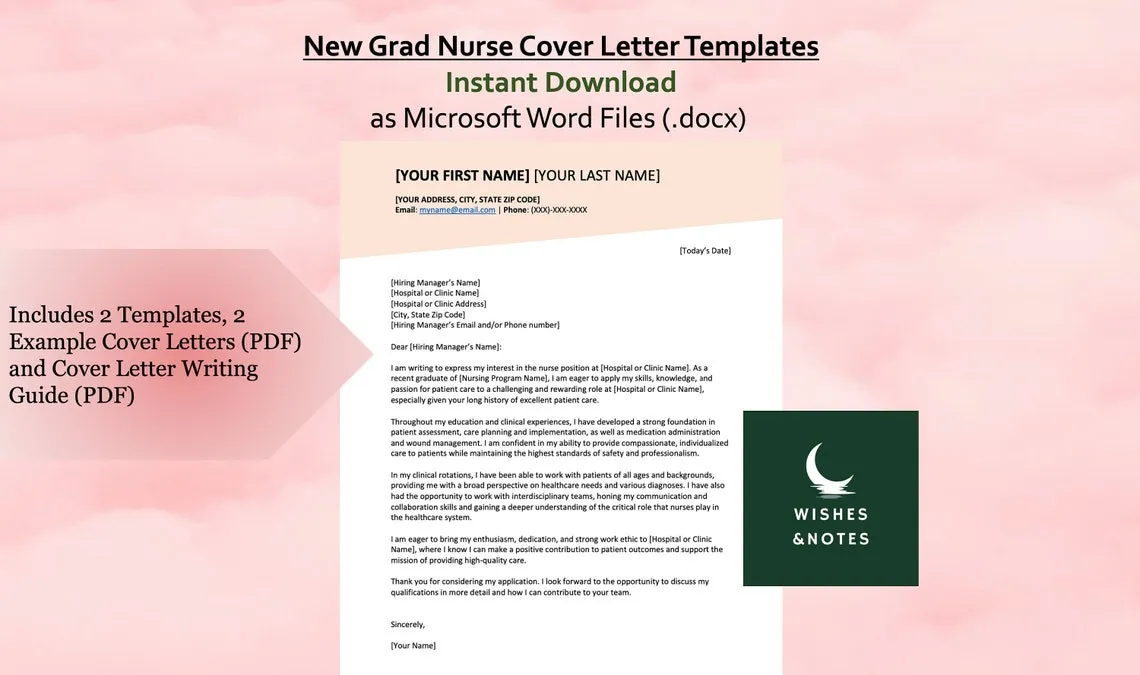
Proofreading is the most critical step in the application process. Before you send your cover letter, carefully proofread it for grammatical errors, spelling mistakes, and typos. Use a spell checker and grammar checker, but don’t rely solely on these tools. Have a friend, mentor, or career advisor review your cover letter. They may be able to catch errors you might have missed. Errors in your cover letter can undermine your credibility and give the impression that you lack attention to detail. A polished cover letter will demonstrate your professionalism and increase your chances of landing an interview. Be sure you check the smallest details as well. Proofreading can make the difference between a rejected application and an interview request.
Seeking Feedback
Finally, seek feedback on your cover letter from trusted sources. Ask a career advisor, mentor, professor, or experienced nurse to review your cover letter and offer constructive criticism. Their feedback can help you identify areas for improvement and ensure your cover letter is as strong as possible. Ask them to assess your cover letter for clarity, conciseness, and professionalism. Asking for feedback shows you are dedicated to improvement and are able to take constructive criticism. Consider the feedback and revise your cover letter accordingly. This process ensures that your cover letter is optimized for the best possible outcome. Getting help is a great way to ensure your cover letter is perfect.
